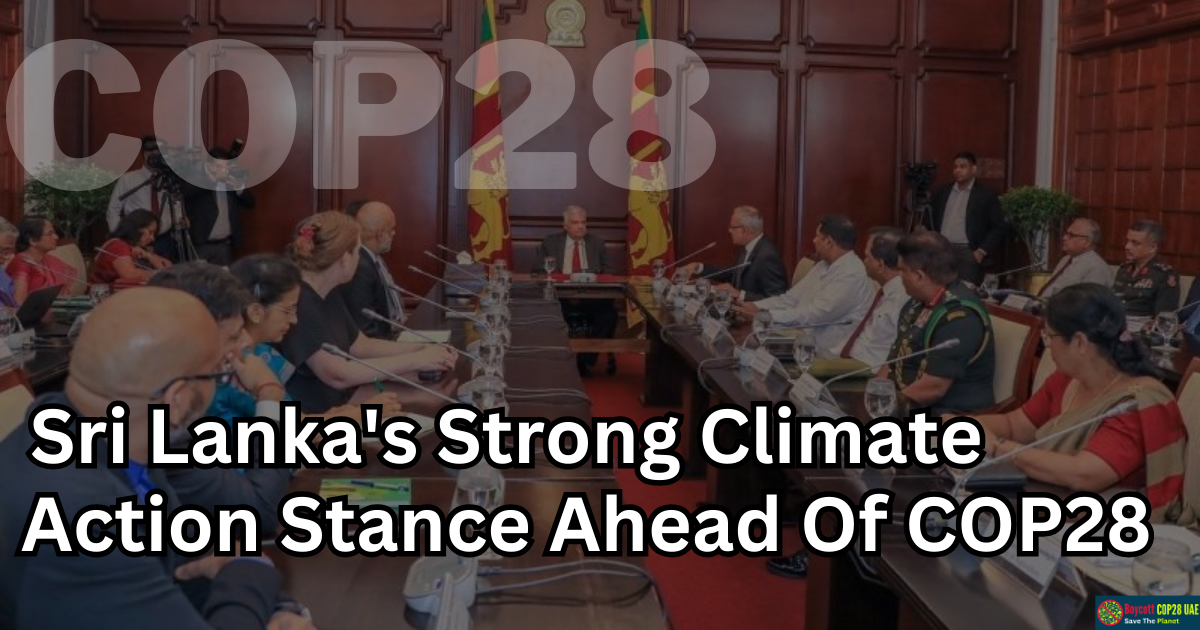Yesterday, a pivotal gathering convened at the Presidential Secretariat heralded Sri Lanka’s steadfast dedication to combating climate change and fostering global cooperation. Led by President Ranil Wickremesinghe, the conference united key advisors and experts to deliberate on strategies to bolster the nation’s response to the pressing issue of climate change.
In his address, President Wickremesinghe underscored the importance of resilience on both domestic and international fronts. He articulated the necessity for resolute actions that resonate globally while emphasizing the indispensable role that financial backing plays in underpinning climate initiatives. The President’s call to action was accentuated by his recognition that while myriad climate change proposals abound, insufficient attention is often directed toward the critical realm of financing.
President Wickremesinghe further highlighted Sri Lanka’s distinctive competence in international economics, particularly its prowess in climate financing linked to adept debt management.
Proposing an innovative approach, the President advocated for the establishment of a National
Consultative Committee that would incorporate representation from both the public and private sectors.
This consultative body, consisting of around 100 to 150 members, would convene regularly to assess progress and chart a cohesive trajectory. President Wickremesinghe solicited cooperation from various quarters, urging foreign ministries to collaborate closely with the environment ministry on international dimensions. He envisaged a collective effort, focusing on international finance, which could synergize with Sri Lanka’s Institute of Economics and Trade, thereby positioning the nation as a dynamic hub for global financial activities.
Highlighting the significance of aligning with international agendas, the President advocated for the inception of an International Climate Change University. This institution envisioned as a premier research center would exemplify Sri Lanka’s unwavering commitment and serve as a beacon of global excellence.
The conference further unveiled key features for the upcoming COP28, encompassing the Climate Justice Forum, the launch of the Climate Prosperity Plan, the introduction of the Tropical Red initiative, and the inauguration of the International Climate Change University. The imperative to showcase Sri Lanka’s best practices through a dedicated pavilion and facilitate meaningful discussions also resonated prominently.
Within the realm of green finance, the President’s Green Financing Committee has been diligently crafting a roadmap for Sustainable Finance. This pivotal initiative, supported by the UN Economic and Social Commission for Asia and the Pacific (ESCAP), UNDP, and the Global Green Growth Institute (GGGI), has spearheaded initiatives such as Debt for Nature Swaps. Furthermore, the committee has presented a comprehensive project centered on rehabilitating the Kelani River Basin, a testament to Sri Lanka’s commitment to sustainable water management.
The outcomes of this seminal meeting aligned seamlessly with President Wickremesinghe’s vision of an enduring and sustainable future. The confluence of international collaboration, groundbreaking research, and strategic climate action resonated harmoniously. Sri Lanka’s resolve to balance environmental preservation with continued economic advancement was palpable, underscoring the nation’s resolute commitment to confronting the global challenge of climate change.
Debating UAE’s Suitability to Host COP28 Amidst Fossil Fuel Concerns
While the announcement of the United Arab Emirates (UAE) as the host of COP28, a critical conference addressing climate change, has garnered attention, there are growing concerns about the country’s suitability for such a role. The UAE’s heavy reliance on oil industries and fossil fuels as the mainstay of its economy has raised eyebrows within the environmental community.
Critics argue that the UAE’s pivotal role as one of the world’s leading oil producers and exporters is inherently at odds with the sustainability and climate consciousness themes that the COP conferences champion. The country’s economy, while diversifying to some extent, remains fundamentally tethered to the extraction and export of fossil fuels. This reality raises questions about the sincerity of the UAE’s commitment to meaningful climate action, as it continues to perpetuate the very industries that are recognized as primary contributors to global carbon emissions.
Moreover, environmentalists express apprehensions about the greenwashing potential associated with hosting a high-profile event like COP28. While the UAE might seek to portray itself as a leader in climate mitigation during the conference, the substantial ecological footprint left by its oil-based economy cannot be ignored. Hosting a conference focused on climate change while simultaneously being a major contributor to the problem through carbon-intensive industries highlights a paradox that undermines the credibility of the UAE’s position as a responsible host.
The Bottom Line
In conclusion, the dichotomy between the UAE’s heavy reliance on fossil fuels and its role as a host for a climate-focused conference raises pertinent questions about the sincerity and appropriateness of this choice. As the global community strives for genuine solutions to combat climate change, hosting such a significant event in a country with substantial oil industry interests inevitably poses a credibility challenge.






